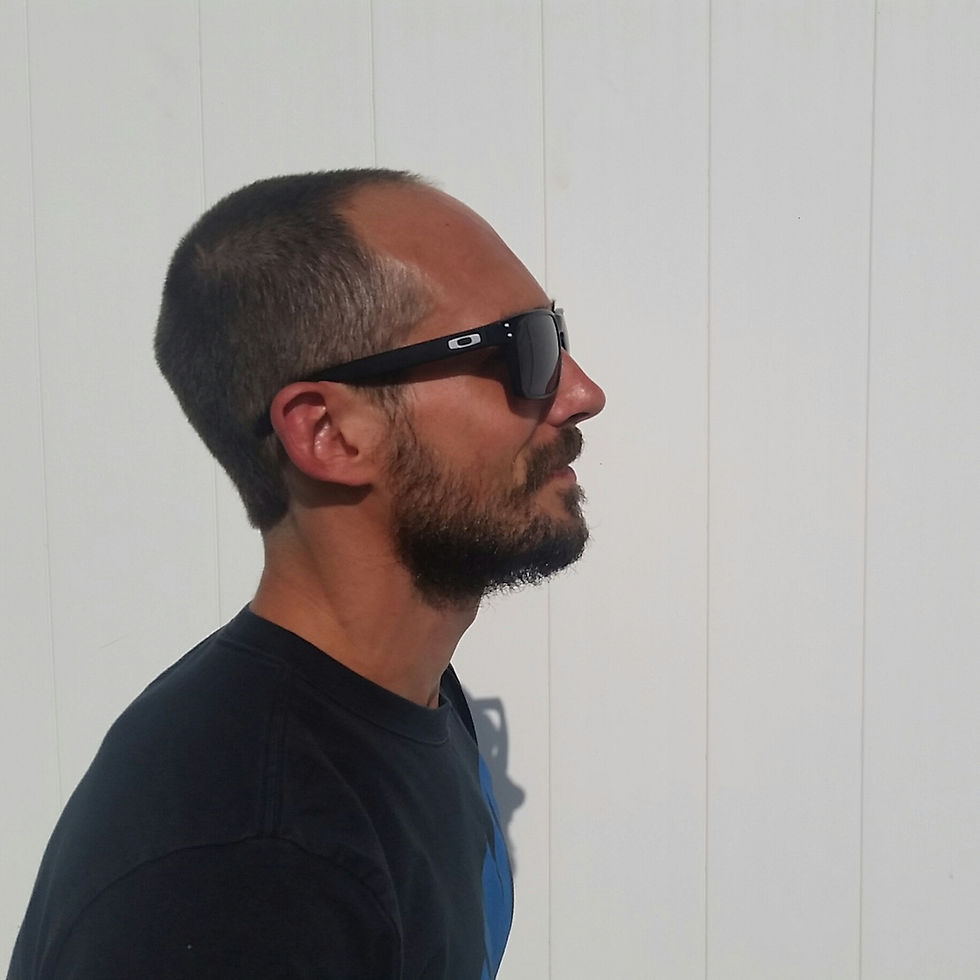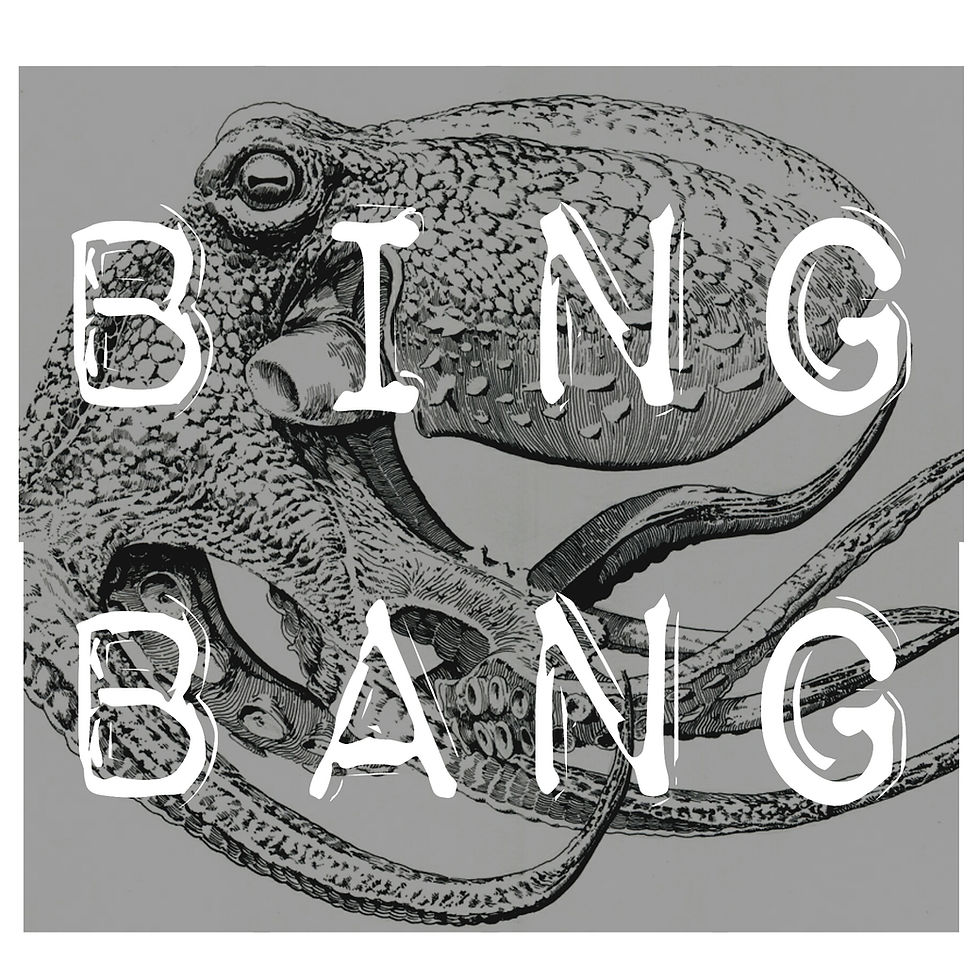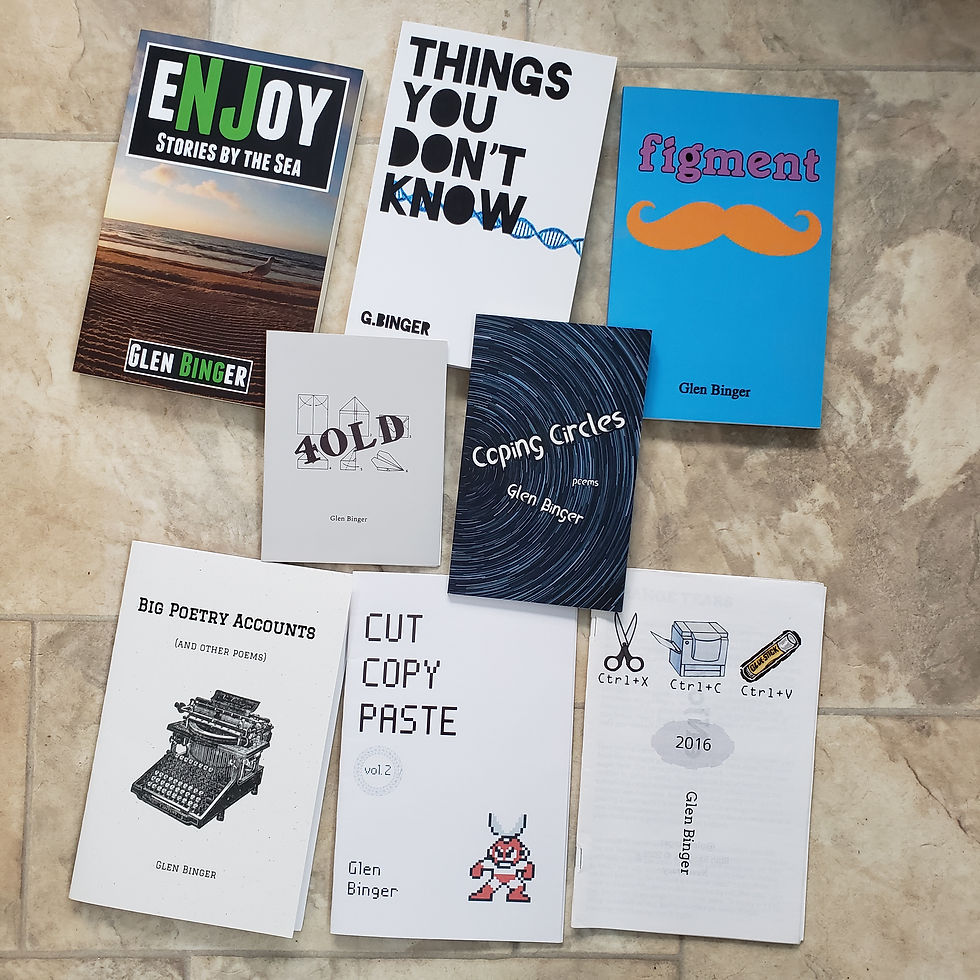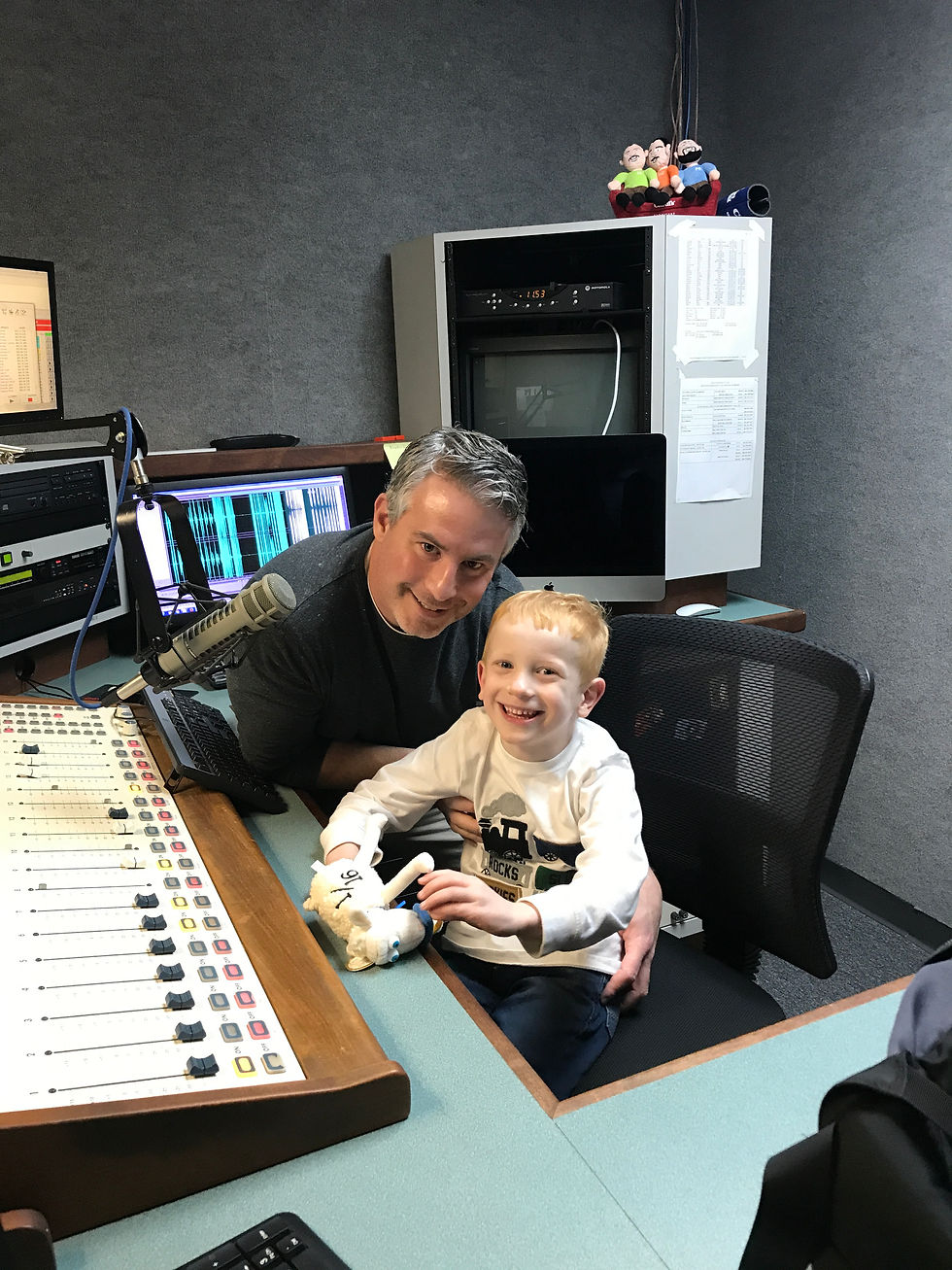Catching the Hustle: A Guide to Blogging and Chapbooks with Glen Binger
- Editors

- Mar 11, 2020
- 8 min read
Updated: Mar 11, 2020
Glen Binger is multi-talented human that brings his writing and artistic expertise to Loud Coffee Press. With a goal of spreading love, Glen talks with us about bucking the system, screwing algorithms, and forging real connections. Oh, and blogging and chapbooks. Read ahead for fresh inspiration on all things #hustle.

1. Thanks for chatting with LCP! Tell us a little about yourself and how you got your writing start.
Hi, I’m Glen! I’m an author, teacher, and coach from by-the-beach, New Jersey. I own and operate Bing Bang Co. and I’m the founding editor of Betterism, a blog dedicated to betterment. My personal blog is called Only Human and that’s more for literary work: my fiction, poetry, prose, and art.
I don’t like labels because human beings are complex and so much deeper than the specifications we paste to our foreheads. That being said, if anything, I feel as if I identify most as a writer. I’ve been telling stories since I could talk and writing them since I could hold a crayon. It’s just how my brain makes sense of this crazy cosmos. After getting a few pieces published in my high school newspaper and literary magazine, I was hooked. I studied Education and English in college and graduate school while writing for various publications and eventually wound up starting my own small press. This was the birth of #hustlewords.
Time is of the essence these days, but I still try to carve out at least 10 minutes each day to let my mind wander and scribble words somewhere. On top of my actual job, I teach workshops, edit manuscripts, coach athletes, writers, poets - not to mention keeping up with my TBR queue. There’s much more behind the scenes of a label than most people realize.
2. How do your blogs distinguish themselves from other blogs on the internet?
I'm not trying to make money with it. My content comes from the heart, the brain, and the soul. It’s not designed to funnel clicks or hashtags. Fuck the algorithms. I want to help people. I want to help people love and think and grow the way social media made us forget how to do.
3. What are your best “dos” and “don’ts” for blog writing? Any stories of triumph or things you had to learn the hard way?
Well, for one, don’t listen to me. Cause I still don’t know the answer. I’ve been blogging publicly since 2007 and it still doesn't make any sense to me. But maybe that’s only because I’m not trying to hack the system like so many others.
When I started, blogging was treated more like journaling or keeping a diary. (Stems from the term ‘weblog’.) Generally, people wrote about their thoughts and their daily life. It evolved, of course, but you can still see some of those infrastructures being used. Capitalism eventually got its fat fingers in there and figured out how to make money from ads and clicks. This is why you see so much garbage click-bait floating around now. Don’t do that. No one respects those kinds of blogs.
There’s a really great book by Ryan Holiday called Trust Me, I’m Lying which covers this whole topic. For anyone looking to build a platform, it’s a must-read.
I’m limited to what I can and can’t apply because I’m a teacher (which, sometimes shoots me in the foot) but I think the biggest piece of advice I can offer is a simple reminder: at their core, blogs are about building a community. There are so many ways one can take that. But without an audience, all you have is a journal. And journaling is a good meditative practice; it promotes mindfulness and sets goals… but it’s not the same thing as blogging. Especially in 2020.
4. How do you keep your blog feeling fresh and inspired?

I think this ties back to the second question. When I create something, I’m trying to either A) help someone learn and grow or B) entertain someone’s emotional & intellectual curiosity. I’m not trying to garnish clicks or sell you shit you don’t need. I want to contribute to a conversation that values thinking, learning, and self-improvement. No matter the content focus. Spread love is the motto.
5. What are your best tips for building an audience?
Be a human. Respect each other, share your work, support others’ accomplishments. I think in this day & age many people forget that it’s a two-way street. It’s a relationship, not a game or a contest. Followers ≠ fans.
Kevin Kelly has this great blog post about a concept he calls “1000 True Fans.” While I think the number is subjective, the core of the idea is what’s important; having a few diehard fans who buy everything you produce is far more rewarding than having millions of casual fans who might pick up what you put out.
Authentic relationships cultivate true fans. Play the long game.
6. Can you recommend any blog-building or blog-writing resources?
This depends very much on what kind of platform one is trying to build. Remember that a ‘blog’ doesn’t only refer to Wordpress or Medium. A blog can be any sort of online venue: YouTube channels, Instagram pages, Twitch streams, even a Twitter account if you play your cards right.
I have a few go-tos that might help, but I tend to lean more towards the educational and literary pursuits. Take that as you will.
1. Trust Me, I’m Lying by Ryan Holiday
2. Real Artists Don’t Starve by Jeff Goins
3. “How to Build a High-Traffic Blog” by Tim Ferriss
a. highly recommend his podcast, so many great episodes on this
4. Mixtus Media offers many great resources
5. Tinyletter or Mailchimp
a. a newsletter service is considered a must by many high-profile bloggers
7. When you write a new post, how do you get the word out? (ie. Social media platforms, etc.)
Depends on the content. I typically use my newsletter as the first mic check. Then I’ll share it across my social media (Twitter, Instagram, Goodreads, etc.). I rely very much on word-of-mouth. But again, don’t listen to me on this one. I really despise when creators shove their content down my throat, so I try my best to NOT do that and keep my pings minimal. This ultimately bites me in the ass, especially when it comes to selling my books. But hey, if there’s any youngblood marketing majors out there looking for some freelance work, hit me up!
8. We know you’ve published several chapbooks. In your words, what is a chapbook?

A chapbook is a piece of handmade art that doesn't quite fit anywhere besides it's own little existence. It is what it is and that’s a beautiful thing.
9. Chapbooks come in all shapes and sizes. When you write one, how do you decide what the end result will look like?
It might sound cliche, but I want it to stand out. I don’t want it to be the same thing that everyone else is doing. The internet is full of that already. If I see a cool concept from an artist I’m following, I’ll try to shape and shift it to fit my vision. You know… that Austin Kleon mindset.
There are many kinds of chapbooks, but they’re all bound by the same medium: paper, ink, paint, tape, staples, twine, string. Within those limits you are limitless. How inspiring is that?!
I’m really proud of my 2019 chap, 4old. That one came to fruition because of a conversation I had with a fellow Jersey creative, Space Bat Killer, at a Bouncing Souls show. He does a lot of sharpie work and that inspired me to push beyond my comfort zone.
10. Do you make your chapbooks yourself or do you outsource them for publications? What are some reasons a writer might consider doing one over the other?
Both. Making one yourself gives you ultimate control over the final product. However, it’s a lot harder to distribute your own without seeming vain and egocentric among a sea of other people doing the same thing. That’s an art I have yet to master. When you go through a small press, you’re giving up a little creative control on the final product at the price of a wider distribution. They typically have a larger fanbase willing to explore lesser-known artists.
Personally, I grew up on punk DIY legends like Aaron Cometbus and Al Burian. That, combined with my musically-ingrained fuck the industry approach, I dug myself into a little hole. But hey, art is art, right? I’m still learning.
11. Are there specific programs or equipment someone interested in creating chapbooks might want to invest in?
All you need is you. Alright... and maybe some cardstock, a creative idea, and a long-reach stapler. There’s a ton of software out there, but I usually stick to Google Slides. Here’s a great starting point. You don’t need much, but you need to be willing to learn.
12. What benefits have you seen in using chapbooks over longer format books for your poetry?
I feel like chapbooks reach more people. It’s difficult to push a full-length collection of poetry when you’re not an algorithm god with thousands of followers across your social accounts. That’s different, of course, if you’re already well-known. Books will make more noise in that light.
I think there’s also something more authentic about a chapbook: it’s handmade. It has more of your personal touch on it. A fan doesn’t get that kind of feel from a book. I wrote 4old and Big Poetry Accounts with just as much heart as Things You Don’t Know, and I feel like the former got more attention even though the latter is more of what the world needs right now. And I’m a nobody. So it goes.
13. How do you distribute your chapbooks?
I try my best to swap IRL because I feel like that’s the most authentic way to build relationships. However, in the age of the internet that's not always possible. I also have an Etsy shop but they take so much of the cut. I usually just try and go direct-to-fan whenever possible. Sometimes I also mail review copies to the small press distributors in my circle. It's pretty cool to see your work end up on the table at Bluestockings or some zinefest out in Cali. (Johnny, from Budget Press, who published Big Poetry Accounts, travels all over the world for those.) Maybe, hopefully, I’ll make it to AWP one day.
14. Any other advice for someone who wants to create a chapbook for the first time?
Be patient. The first one won’t be as loud as you want it to be. That’s okay. Pick up other people's work, get a feel for the creative space you have to work with. Support the scene. Try to be original. Ignore the algorithms. And, most importantly, make more of them.
We’d like to give you a lightning round of questions:
Nice, this is always my favorite part!
a. Name three bands you’re currently loving:
Ooo, tough one! I’m gonna add a bonus one here because it’s March 11th:
1. Bikini Trill
2. Out Of Service
3. Eleven, Three-Three Eleven. 🤘
4. Warish
b. Tell us two books you’d give to another writer:
1. Perennial Seller by Ryan Holiday
2. Thrill Me by Benjamin Percy
c. Recommend an excellent movie:
The Matrix is my go-to. Also, The Great Hack documentary on Netflix... because most people don’t understand how their personal data is being used against them.
d. If there’s a tattoo you’re dying to get, would you tell us about it?
I’ve been thinking about finishing my sleeve lately. It’s a Jules Verne-inspired underwater kraken scuffle that ends at the elbow. I’ve been meaning to bring that down to my wrist with some more nautical adventure.
e. What’s one pop culture thing that people love that they should hate:
Only one? Hmm, I’d have to go with all the Disney remakes. I love the classics, don’t get me wrong, but at this point it’s clearly a cash-grab.
f. Do you like bees?
Yes, of course! I think people underestimate how important they are to our ecosystem on Earth.
Finally, where can our readers find you on the internet and social media?
Catch my books, blogs, and art here: https://linktr.ee/bingbangbooks
Subscribe to my newsletter here: https://tinyletter.com/bingbangco
And I’m on Twitter: @glenbinger and Instagram: @bingbangbooks
Thanks for having me on, guys! Appreciate the love. eNJoy!








When asked for advice and the first thing someone says is "don't listen to me", that makes me trust them more than I would have. Thanks for the interview, man. You gave me some things to think about, and I've added a few items to my library list now.